Blue Wave Rolling: Democratic presidential hopefuls reach out to voters in California Democratic State Convention
June 1, 2019
More than a dozen Democratic presidential hopefuls travelled to San Francisco this week to attend the California Democrats’ State Convention at the Moscone Center. 11 of those candidates addressed an audience of more than 3,000 at the morning and afternoon general sessions, presenting highlights of their individual campaign platforms in hopes of winning primary votes from the crowd.
The convention kicked off this Friday with several workshops, caucuses and a welcome reception for the California Democratic Party (CDP) Acting Chair, Alex Gallardo-Rooker.
This morning, on the second day of the three-day convention, notable speakers including Democratic presidential hopefuls Kamala Harris, Beto O’Rourke and Elizabeth Warren projected their message to a convention hall packed full of spectators.
Harris, the first Democratic presidential hopeful to speak at the convention, emphasized the need to fight for social justice. She is currently third in national polls, behind former Vice President Joe Biden and Sen. Bernie Sanders.
“We need to fight hate wherever we find it. Whether it’s racism, anti-Semitism, homophobia, transphobia, Islamophobia, we’ve got to speak truth,” Harris said. “We’ve got to fight those who deny women the right to do what they please with their bodies.”
Next up, O’Rourke called for large-scale immigration reform that would end the current administration’s child separation policies. Further, he introduced plans for legalizing the millions of undocumented citizens currently living in the United States.
“More than 11 million of our fellow Americans, undocumented, working some of the toughest jobs of this country that no one else in this country is willing to work right now, who live among the shadows, fearing deportation – we need to make them the newest citizens in this country, their home country,” O’Rourke said.
Lastly, Warren, building off her theme of having plans, highlighted the need for changes in the nation’s political system. For example, she called for all future presidential candidates to be required to release their tax returns.
“When a candidate tells you something isn’t possible, about how you should settle for a little less rather than real change, or telling you to ignore something important, they are telling you they’re not going to fight for you,” Warren said.

The presidential speaker lineup continued with the afternoon session, which featured Democratic hopefuls Sen. Kirsten Gillibrand, Rep. Tulsi Gabbard, South Bend Mayor Pete Buttigieg, Rep. Eric Swalwell, Sen. Amy Klobuchar, former Colorado Gov. John Hickenlooper, Washington Gov. Jay Inslee and Sen. Cory Booker.
Of the 11 total candidates to speak, eight—O’Rourke, Gabbard, Gillibrand, Buttigieg, Swalwell, Klobuchar, Hickenlooper and Inslee—vowed to fight climate change, the most widely discussed issue of today’s sessions.
In fact, environmental reform has emerged as a primary concern for many voters heading into the 2020 elections.
“I am an activist who is concerned about the future of San Francisco, California, and the country, and the world,” attendee Arthur Persyko, who campaigns for candidates on the local, state and national levels, said. “I believe that we are the stewards of the planet and our politics. We need to take care of each other, and politics is one way to do that.”
Throughout today’s sessions, four candidates—Buttigieg, Gilibrand, Swalwell and Klobuchar—advocated for education reform, such as mitigation of student loan debt, free public college and universal childcare. Six—O’Rourke, Warren, Gillibrand, Gabbard, Swalwell and Hickenlooper—voiced their support for universal healthcare, and four—Buttigieg, Booker, Swalwell and Hickenlooper—promised increased gun regulation. Five—Harris, Buttigieg, Klobuchar, Gillibrand and Hickenlooper—called for greater gender equality and LGBTQ+ empowerment.
These issues, along with climate protection, have become focus points of the Democratic primaries race, drawing the attention and concern of many voters, especially younger voters.
“I would hope that [student voters] would want to defeat climate change, and I would hope that they would share the respect for diversity—since we believe that diversity is a virtue not a vice—and if they believe those things, I would encourage them to take a look at my candidacy. I would be honored by their vote,” Inslee said in an interview with Harker Aquila after the session.
Today’s speakers also sought to connect with the rising generation of student voters, speaking to the cost of attending college, the necessity of climate change and the urgency of gun control in light of recent school shootings.
“Students are the generation that are up and coming. We are the generation that is going to make the difference. The older generations—they’ve been around, they have the experience—but we have the vision for the future because we have to live it,” said Meghna Phalke (‘19), who attended today’s afternoon general session.
Several of the presidential candidates also brought up their political records in order to convince Democratic delegates and voters of their ability to win the presidency and implement effective reforms, emphasizing the importance of bipartisanship along the way.
“What sets me apart is the fact that I was the chief executive of a city that was decaying with crime and corruption, and we together turned that city around. I am the mayor of the largest city in my state, and I am now a senator that has a reputation for getting big things done across the aisle,” Booker said in an interview with Harker Aquila. “The last thing is the idea of bringing people together. That is really one of the best things that we can do right now—to bring people together to try and overcome the divisions that are tearing up this country.”
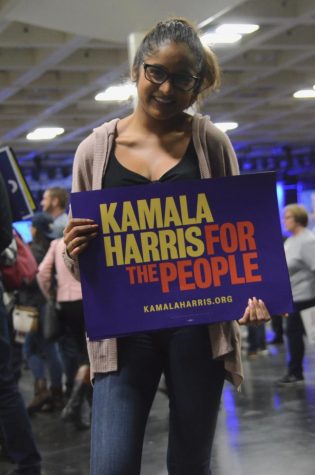
Meghna Phalke (’19) poses with a Kamala Harris poster during the afternoon General Assembly on Saturday. “Students are the generation that are up and coming; we are the generation that is going to make the difference,” Meghna said.
While some candidates used their career histories as talking points to argue for their qualifications, other sought to sway voters by connecting on a more personal basis, either by telling the story of their family, as Klobuchar did, or by emphasizing their understanding of local issues.
“I see myself as a voice to combat these issues because I live here and see these issues,” Swalwell said in an interview with Harker Aquila. “If we want to solve these generational issues, we need a generational candidate. We can’t have the same old ideas solving the same old ideas. I am inspired by the Bay Area because what I see here is inclusiveness, I see innovation, I see equality and I just think that if I see that here, we should be able to see it anywhere.”
Swalwell’s California-centric approach to his speech today appealed to many Californian voters, particularly those in his district, the 15th, which includes the cities of Fremont, Hayward and Pleasanton. Some of those voters even arrived at the session wearing T-shirts and carrying banners that proclaimed their support for Swalwell, joining crowds of other attendees who bore similar paraphernalia in support of the other candidates.
“Honestly, Eric Swalwell motivated me to come out today—I live in his district, and I see what he’s done for us and I agree with his policies,” said attendee Haya Hardari, who is currently a sophomore in college.
Following the 2020 presidential candidates’ speeches, candidates for CDP chair addressed the crowd. Other speakers from today’s two sessions included former Former San Francisco Mayor Willie Brown, current San Francisco Mayor London Breed, Governor Gavin Newsom, U.S. House Speaker Nancy Pelosi, Lt. Governor Eleni Kounalakis, California Attorney General Xavier Becerra and California Treasurer Fiona Ma.
Many of these speakers echoed the presidential candidates’ points as well, particularly regarding the central issues of the Democratic Party’s platform such as generational change and the importance of political participation among younger voters.
“As youth [voters], you know what you want from [a candidate] and what you got. You’re the experts on the state of the world right now,” candidate for CDP chair Lenore Albert said in an interview with Harker Aquila. “Also, with our endless wars, students are the ones getting recruited to fight from high school onwards. You guys are a big enough generation to have a voice and influence change. You’re going to be the ones saddled with the consequences our generation makes. Anything that happens now will affect the whole trajectory of the future.”
Many current high school juniors and seniors across the nation will be able to vote in the 2020 election, and as reflected in the Democratic candidates’ speeches, younger voters are gaining influence in the national political sphere, from bringing their concerns to the forefront of the debate to deciding the eventual nominee for president.
“I think it’s incredibly important to vote for our own future because we’re the ones that are going to have to experience the consequences or the positive endings of whatever we end up doing in this election,” Meghna said. “This election is incredibly pivotal, and I feel like students especially now, they’re seeing the impacts of what’s going on when we leave it to the adults. The responsibility isn’t theirs anymore—the responsibility is ours.”
This story was updated at 7:08 p.m. on June 1, 2019, to include additional information about the afternoon session.
Correction: A previous version of this article misidentified former Colorado Gov. John Hickenlooper. The article has been updated to reflect this misidentification.
Sanders, Castro and Delaney join Democratic presidential candidates at CDP
Several hundred California Democrats gathered for a final day of speeches, caucuses and workshops at the California Democrats’ State Convention, held in the Moscone Center of San Francisco. Today featured presidential candidate speakers Sen. Bernie Sanders, D-V.T., former Secretary of Housing and Urban Development Julian Castro and former Maryland U.S. House Representative John Delaney.
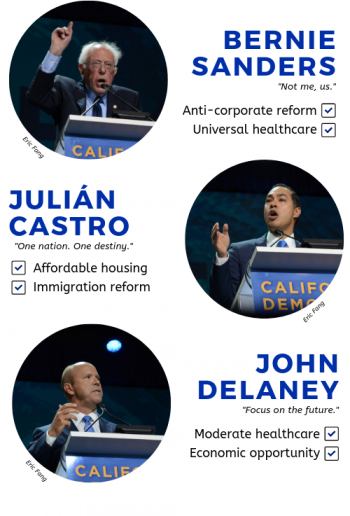
Sanders kicked off today’s lineup with a speech that was centered around the phrase “no middle ground,” connecting his self-described democratic socialist platform to a call for generational change. Among Sanders’ notable stances are a single-payer universal healthcare system, anti-capitalist economic policies and taxes, environmental protection, drug industry reform and a clean energy system that, as Sanders said in his speech, “represents all of us, not just the one percent.”
“We have got to make it clear that when this country drift towards oligarchy, there is no middle ground,” Sanders said in his address during the session. “Large profitable corporate companies like Amazon will pay their fair share of taxes.”
Sanders’ stance reflects a shift towards anti-corporate economic policies among Democrats across the nation, and during a brief open-microphone after the presidential candidates’ speeches at this morning’s session, San Francisco Region 6 director Hene Kelly voiced a similar view on corporate power and funding.
Kelly, who is a retired middle and high school teacher as well as a former union member, called for greater union power, protesting the California Democratic Party’s (CDP) acceptance of funding from Uber, Lyft and Juul Labs. In an interview with Harker Aquila after the open-mic, Kelly urged action against the influence of corporations in politics.
“Vote your heart. Vote for somebody who has your ideas, but remember, not everybody agrees with everything,” Kelly said. “So look at what they stand for, and who is closest to you.”
Sanders also called attention to a growing divide among the Democratic presidential hopefuls between moderates and more progressive candidates. Sanders, who is currently second in polls to former Vice President Joe Biden, called attention to Biden’s absence this weekend.
Biden has presented himself as a more moderate, established candidate for president in contrast to Sanders’ campaign, which is centered around his democratic socialist policies and his appeal to younger voters.
“As you all know, there is a debate among presidential candidates who have spoken to you here in this room and those who have chosen for whatever reason not to be in this room about the best way forward, so let me be as clear as I can be,” Sanders said in his speech today. “In my view, we will not defeat Donald Trump unless we bring excitement and energy into the campaign and unless we give millions of working people and young people a reason to vote and a reason to believe that politics is relevant to their lives.”
After Sanders’ speech, Joaquin Castro, who is currently a congressional representative from Texas’s 20th District, next introduced his twin brother Julián Castro. Before running for president, Castro ran successfully for mayor of his hometown, San Antonio, Texas.
In his speech, Castro emphasized the immigrant history of both the United States and his family. As a child, Castro’s mother was a Chicana political activist who helped establish the Chicano political party La Raza Unida.
“My mother would never believe that one of her sons would now be a congressional representative and another is running for President of the United States,” Castro said during his speech.
As the Secretary of Housing and Urban Development from 2014 to 2017, Castro expanded lead safety protections in federally assisted housing and worked to stabilize the housing market.
In addition, Castro reiterated his support for Universal Pre-K and Medicare for All. In his first day in office, he pledged to recommit the United States to the Paris Climate Accords and spoke of implementing a tradition of ushering out the next president and his or her family.
In an interview with Harker Aquila, Castro discussed his campaign policies that he believes would win over students who will become eligible to vote in 2020.
“I released the first education plan that calls for universal higher education, tuition-free public universities, community colleges and job training and certification programs, and also includes student loan debt relief for young people who have incurred a lot of debt,” Castro said, referring to a proposal he released early May. “In addition to that, I’m tackling big issues like climate change that this youngest generation has the biggest stake in.”
In the same interview, Castro praised the merits of proposals by many Congressional Democrats, including Speaker of the House Nancy Pelosi, to lower the voting age to 16 or 17.
“Here’s why I’m a fan of [lowering the voting age]. Because right now, if somebody turns 18, they’re kind of in an in-between period. Oftentimes, either they’re starting college or they’re working, or they’re going into the military, or they’re in a transition period, where they’re less likely to take up the new practice of going and voting,” Castro said in the interview. “If we move that down, let’s say to 17, then you catch them when they’re still in high school, when they’re within an institution that can foster a culture of actually voting.”
Following Castro, Delaney brought a more moderate campaign to the stage, rejecting the idea of “Medicare for All.” To the protests of many audience members, Delaney cautioned that many Americans may actually lose healthcare under a universal healthcare plan.
Though he diverged from several of his fellow Democratic candidates in cautioning against universal single-payer healthcare, Delaney followed the trend set by speakers before and after him of reaching out to the younger generation of voters, including current 16 and 17-year-old high school students who will be able to cast their ballot in the 2020 election.
Newly elected CDP chair Rusty Hicks pointed out the potential of the Democratic Party to draw younger voters and encourage greater political participation among students.
“I think we can appeal to the new generation of student voters, and that’s totally focusing on the issues that are important to them but also ensuring that they too are at the tables where decisions are being made within our party,” Hicks said in an interview with Harker Aquila. “Whether it’s college Dems or the California Democrats who can play a leadership role in that, we as a party can support them in a very meaningful way.”
According to a press release from the CDP, this weekend’s state convention was the “largest gathering of active Democrats” in California, numbering 5,000 in expected attendees.
Meanwhile, President Donald Trump announced his first rally for his second term campaign via Twitter on Friday, which will be held in Orlando on June 18.
The first Democratic primaries debate will be hosted by NBC in Miami on June 26 and June 27, with a lineup that will be chosen at random from candidates who have met polling or donor qualifications. The next CDP gathering will be held at Long Beach on Nov. 15 through Nov. 17.
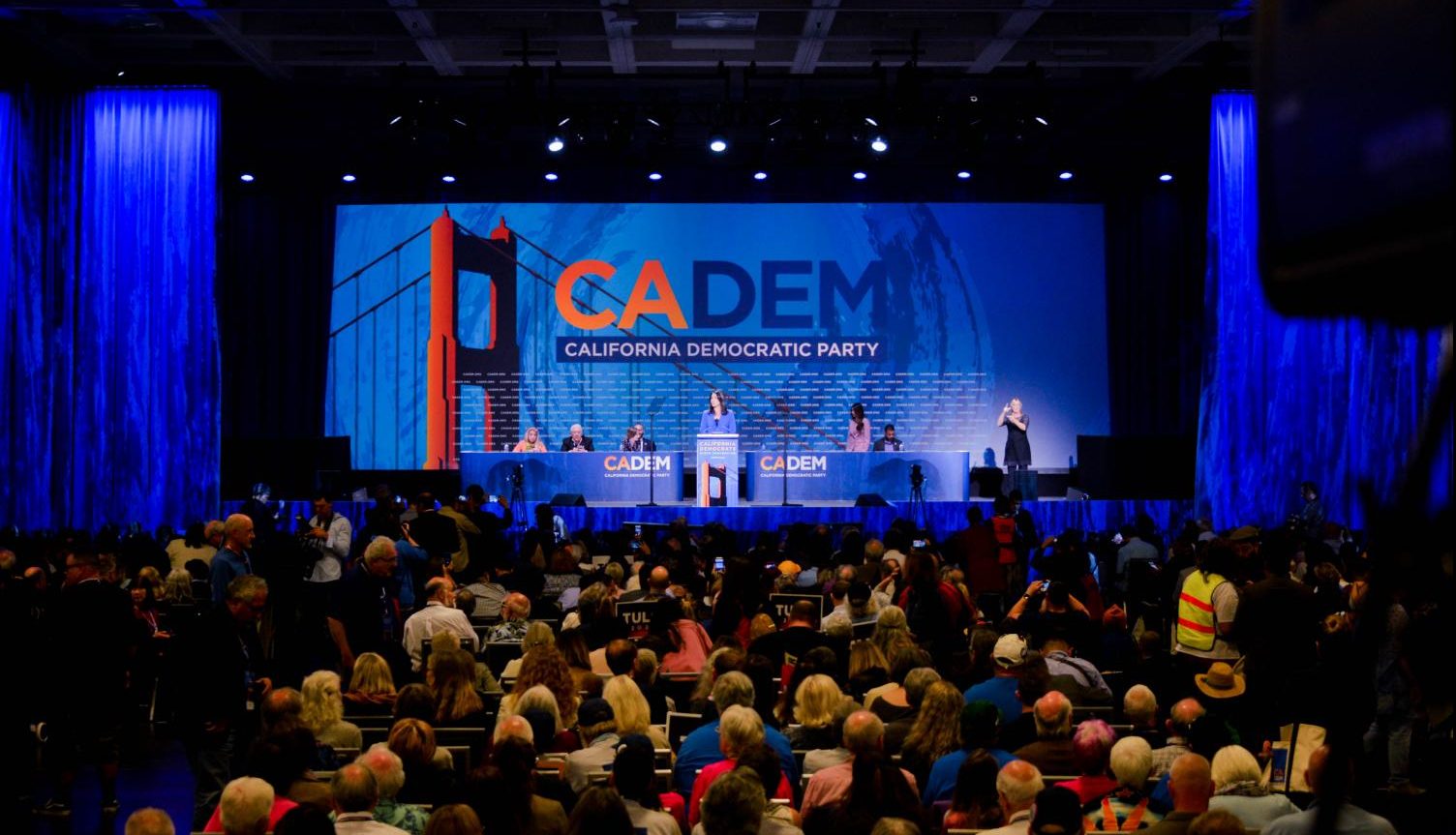
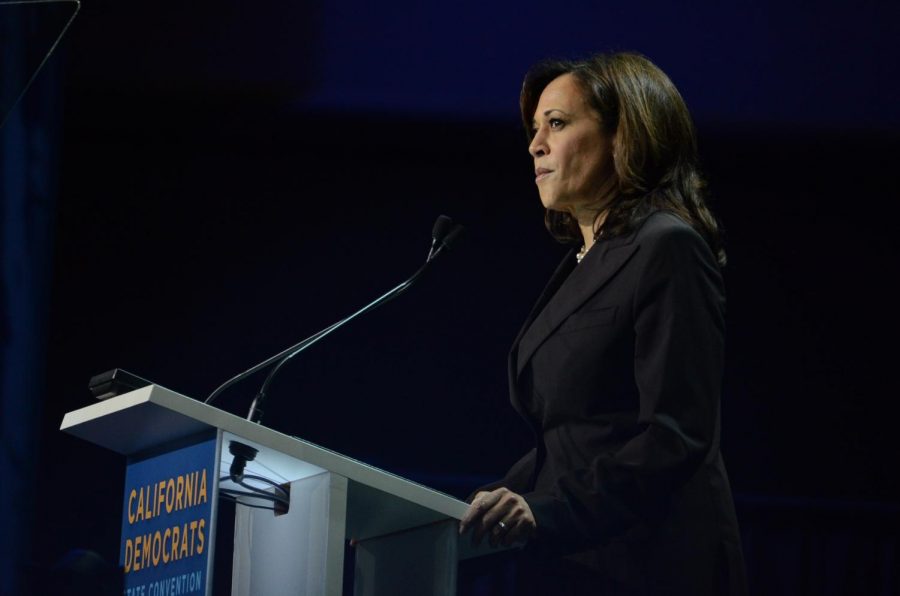
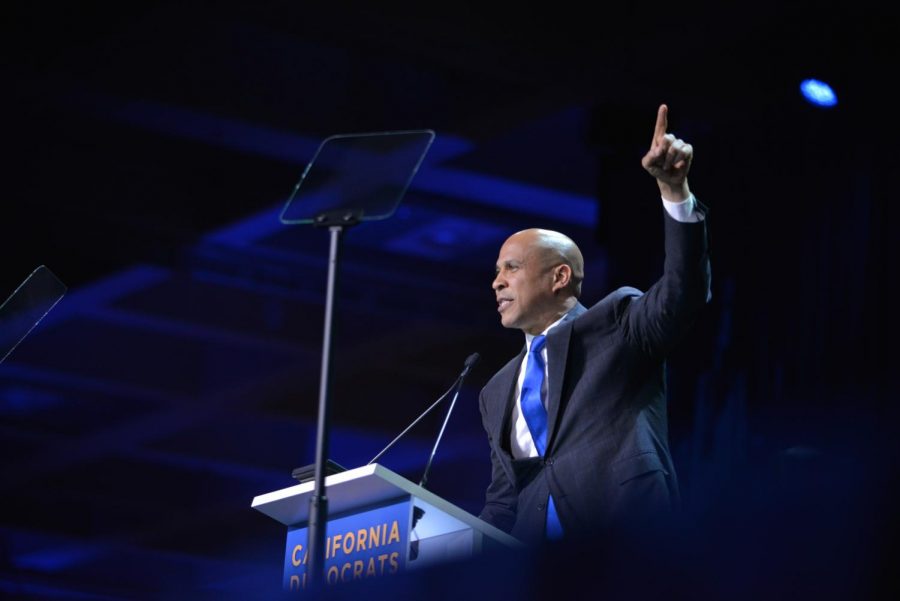
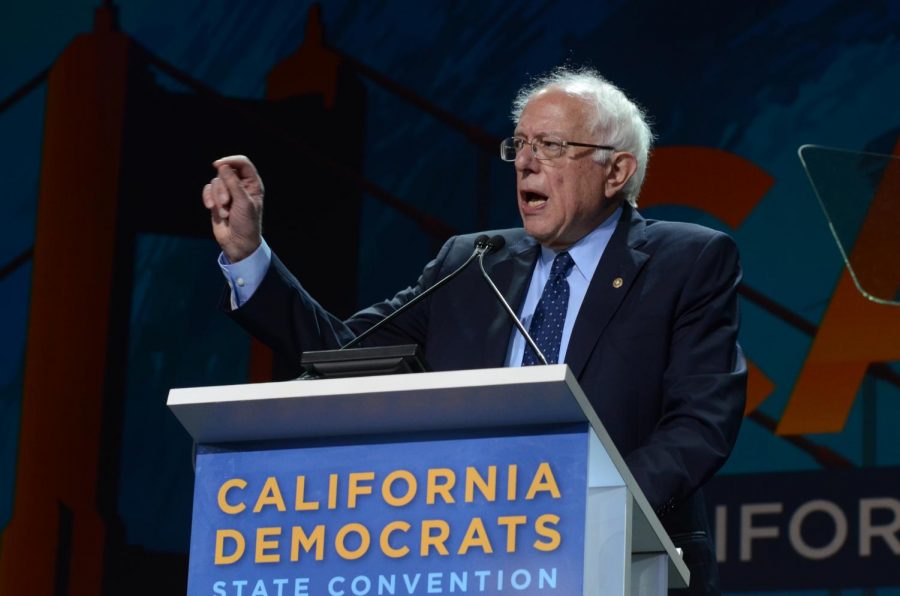
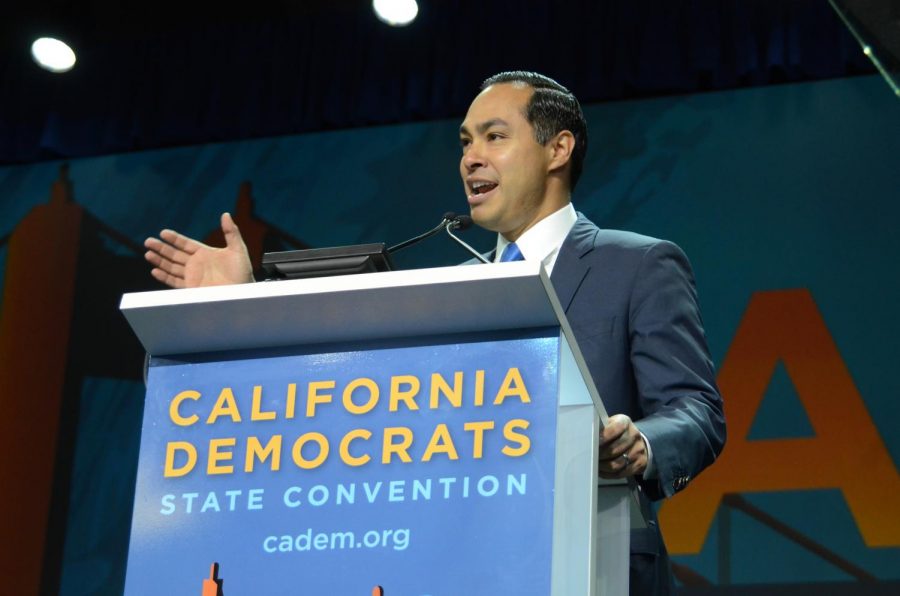
Susan Nace • Jun 1, 2019 at 4:17 pm
Amazing work! Thank you!
A suggestion: “caucuses,” otherwise we are talking about geography.